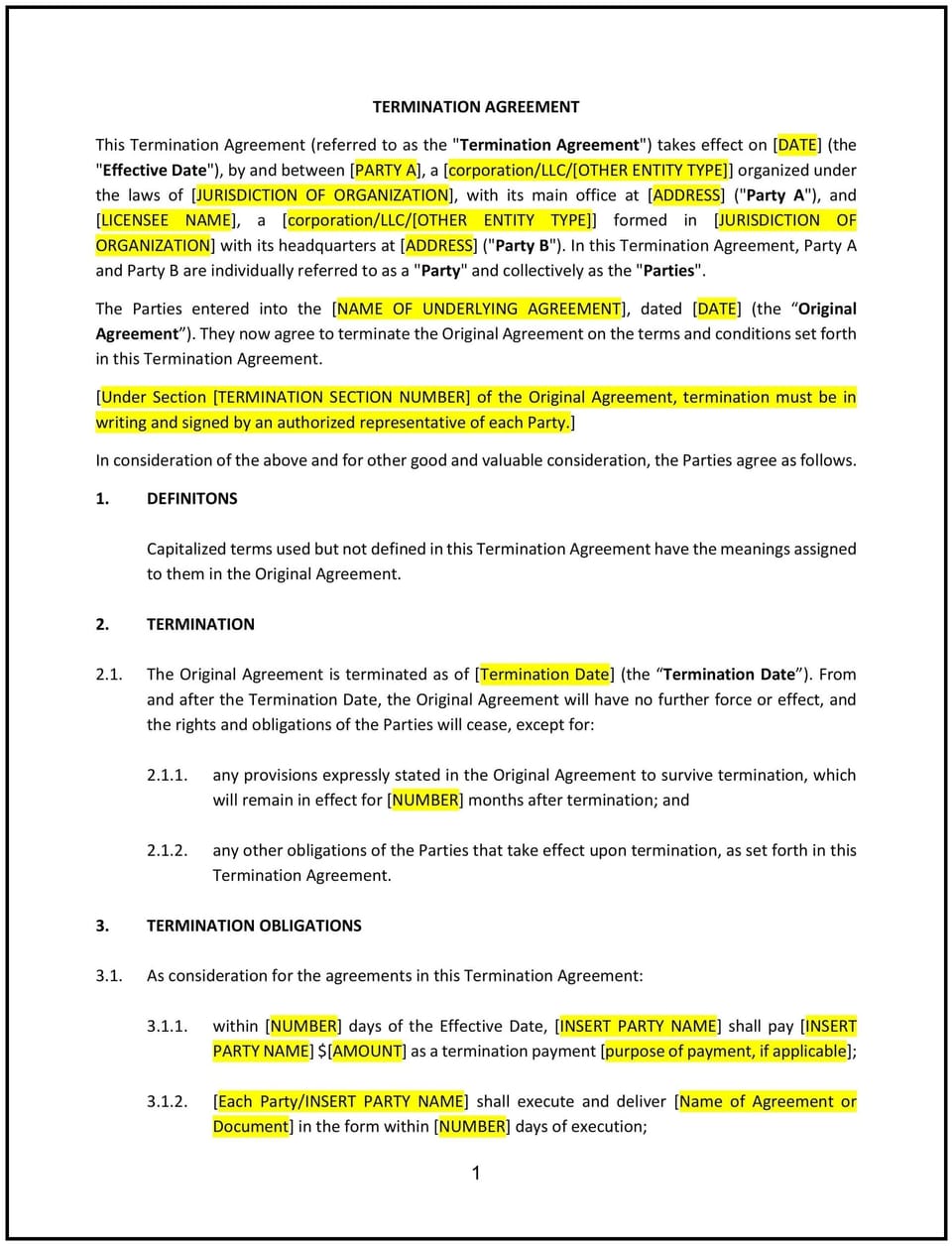Termination Agreement (Kansas): Free template

Termination Agreement (Kansas)
A Termination Agreement is a legal contract between two or more parties that formally ends an existing business relationship, partnership, or contract. In Kansas, this agreement must comply with state laws regarding contracts and business operations. A well-drafted agreement ensures clarity, minimizes disputes, and provides a smooth transition for all parties involved.
For example, a retail company in Overland Park might terminate its partnership with a supplier due to changing business needs. A clear agreement specifies the terms of termination, including final payments, asset transfers, and confidentiality obligations.
Tips for drafting and maintaining a Termination Agreement in Kansas
- Identify the parties: Clearly specify the names, contact information, and roles of all parties involved in the termination.
- Example: “This Termination Agreement is entered into by [Party A Name], located at [Address], and [Party B Name], located at [Address].”
- Define the purpose: Explain the reason for the termination and reference the original agreement being terminated.
- Example: “This agreement terminates the Business Collaboration Agreement dated [Date] between [Party A] and [Party B].”
- Specify the effective date: Define the date on which the termination takes effect.
- Example: “This agreement shall become effective on [Date].”
- Address final obligations: Outline any remaining obligations, such as final payments, asset transfers, or confidentiality requirements.
- Example: “Party A agrees to pay Party B $5,000 as a final settlement within 30 days of the termination date.”
- Include release clauses: Specify that both parties release each other from further claims or liabilities related to the original agreement.
- Example: “Both parties agree to release each other from any further claims, liabilities, or obligations arising from the original agreement.”
- Add confidentiality provisions: Include clauses to protect sensitive information shared during the original agreement.
- Example: “Both parties agree to maintain the confidentiality of all proprietary information disclosed during the original agreement.”
- Outline governing law and jurisdiction: Ensure the agreement specifies that it is governed by Kansas law and identifies the appropriate courts for dispute resolution.
- Example: “This agreement is governed by the laws of the State of Kansas. Any disputes shall be resolved in the courts of [County], Kansas.”
- Include signatures: All parties must sign and date the agreement to make it legally binding.
- Example: “IN WITNESS WHEREOF, the parties have executed this Termination Agreement as of the date first written above.”
Frequently asked questions (FAQs)
Q: Are Termination Agreements enforceable in Kansas?
A: Yes, Termination Agreements are enforceable in Kansas if they are clear, reasonable, and comply with state contract laws. Courts may modify or invalidate agreements with vague or unfair terms.
Q: What happens if one party breaches a Termination Agreement in Kansas?
A: If one party breaches the agreement, the other party may pursue legal remedies such as monetary damages, injunctive relief, or specific performance, depending on the terms specified in the contract.
Q: Can a Termination Agreement in Kansas include confidentiality clauses?
A: Yes, confidentiality clauses can be included to protect sensitive business information. These clauses are generally enforceable as long as they are reasonable and necessary.
Q: Does Kansas require written Termination Agreements?
A: While oral agreements may be enforceable, written agreements are strongly recommended to ensure clarity and protect the interests of all parties.
Q: Can a Termination Agreement in Kansas be modified?
A: Yes, the agreement can be modified if all parties agree to the changes in writing.
This article contains general legal information and does not contain legal advice. Cobrief is not a law firm or a substitute for an attorney or law firm. The law is complex and changes often. For legal advice, please ask a lawyer.


